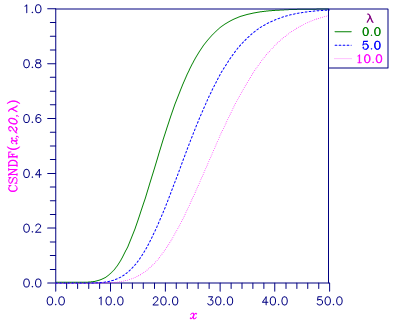nonCentralChiSq¶
Evaluates the noncentral chi-squared distribution function.
Synopsis¶
nonCentralChiSq (chiSquared, df delta)
Required Arguments¶
- float
chiSquared(Input) - Argument for which the noncentral chi-squared distribution function is to be evaluated.
- float
df(Input) - Number of degrees of freedom of the noncentral chi-squared distribution.
Argument
dfmust be greater than 0. - float
delta(Input) - The noncentrality parameter. delta must be nonnegative, and
delta+dfmust be less than or equal to 200,000.
Return Value¶
The probability that a noncentral chi-squared random variable takes a value
less than or equal to chiSquared.
Description¶
Function nonCentralChiSq evaluates the distribution function of a
noncentral chi-squared random variable with df degrees of freedom and
noncentrality parameter alam, that is, with v = df, λ = alam,
and x = chiSquared,
where Γ (⋅) is the gamma function. This is a series of central chi-squared distribution functions with Poisson weights. The value of the distribution function at the point x is the probability that the random variable takes a value less than or equal to x.
The noncentral chi-squared random variable can be defined by the distribution function above, or alternatively and equivalently, as the sum of squares of independent normal random variables. If \(Y_i\) have independent normal distributions with means \(\mu_i\) and variances equal to one and
then X has a noncentral chi-squared distribution with n degrees of freedom and noncentrality parameter equal to
With a noncentrality parameter of zero, the noncentral chi-squared distribution is the same as the chi-squared distribution.
Function nonCentralChiSq determines the point at which the Poisson
weight is greatest, and then sums forward and backward from that point,
terminating when the additional terms are sufficiently small or when a
maximum of 1000 terms have been accumulated. The recurrence relation 26.4.8
of Abramowitz and Stegun (1964) is used to speed the evaluation of the
central chi-squared distribution functions.

Figure 11.5 — Noncentral Chi-squared Distribution Function
Example¶
In this example, nonCentralChiSq is used to compute the probability that
a random variable that follows the noncentral chi-squared distribution with
noncentrality parameter of 1 and with 2 degrees of freedom is less than or
equal to 8.642.
from __future__ import print_function
from numpy import *
from pyimsl.stat.nonCentralChiSq import nonCentralChiSq
chsq = 8.642
df = 2.0
alam = 1.0
p = nonCentralChiSq(chsq, df, alam)
print("The probability that a noncentral chi-squared random")
print("variable with %2.0f df and noncentrality parameter %3.1f is less" % (df, alam))
print("than %5.3f is %5.3f." % (chsq, p))
Output¶
The probability that a noncentral chi-squared random
variable with 2 df and noncentrality parameter 1.0 is less
than 8.642 is 0.950.